
Emma Minna Hilde Hildebrand was a German actress born in Hanover, Germany on 10 September 1897. She died at the age of 78 in Grunewald, Berlin, on 27 May 1976.
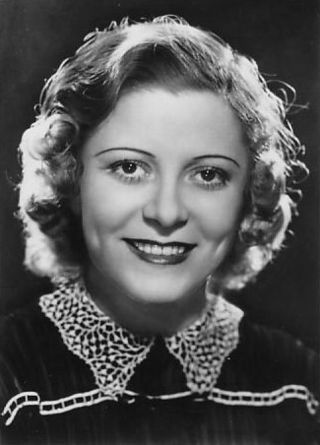
Maria Cebotari was a Bessarabian-Romanian lyric coloratura soprano. She was widely known as a singer by the mid 1930s and noted in particular for her wide range of repertoire.

Fridericus is a 1937 German historical film directed by Johannes Meyer and starring Otto Gebühr, Hilde Körber and Lil Dagover. It is based on the life of Frederick II of Prussia. It was part of the popular cycle of Prussian films and was shot at the Halensee Studios in Berlin and on location in Brandenburg. The film's sets were designed by the art directors Otto Erdmann and Hans Sohnle.

Der singende Tor is a 1939 German-Italian musical film directed by Johannes Meyer and starring Beniamino Gigli, Kirsten Heiberg, and Hilde Körber. It was a co-production made at Cinecittà Studios in Rome with a German director and a cast of mixed nationalities. The film's sets were designed by the art director Otto Guelstorff. A separate Italian version called Casa lontana was also made.

Trouble Backstairs is a 1935 German romantic comedy film directed by Veit Harlan and starring Henny Porten, Else Elster and Rotraut Richter. It marked the directoral debut of Harlan, who had previously worked as an actor, and quickly developed as a leading director of Nazi Germany. It was based on a play by Maximilian Böttcher, and was remade in 1949.

The Burning Secret is a 1933 Austrian-German drama film directed by Robert Siodmak and starring Alfred Abel, Hilde Wagener and Hans Joachim Schaufuß. It was based on the 1913 novella of the same title by Stefan Zweig. It was released by the German branch of Universal Pictures. It was shot at the EFA Studios in Berlin and on location around Ascona in Switzerland. The film's sets were designed by the art director Robert A. Dietrich.
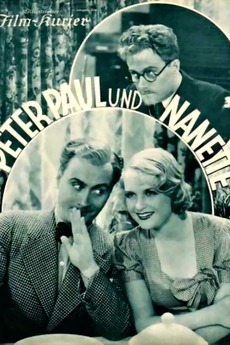
Peter, Paul and Nanette is a 1935 German comedy film directed by Erich Engels and starring Hermann Thimig, Hans Junkermann and Hilde Krüger.

His Late Excellency is a 1935 German historical comedy film directed by Hans H. Zerlett and starring Arthur Schroder, Rose Vollborn, and Hansjoachim Büttner. Following the death of the ruler of a German principality in the nineteenth century, intrigue breaks out in the struggle to succeed him.
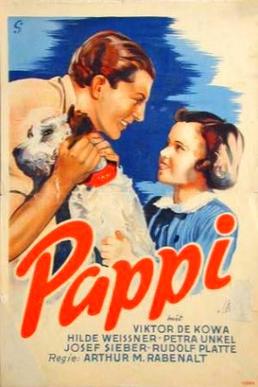
Pappi is a 1934 German comedy film directed by Arthur Maria Rabenalt and starring Viktor de Kowa, Hilde Weissner and Petra Unkel. It is part of the circus film genre.

The World's in Love is a 1935 Austrian comedy film directed by Viktor Tourjansky and starring Mártha Eggerth, Leo Slezak and Ida Wüst. It is based on the operetta Clo-Clo. The film's sets were designed by the art director Julius von Borsody. It was remade in Britain the following year as Dreams Come True.
Hermine and the Seven Upright Men is a 1935 German drama film based on the novella Das Fähnlein der sieben Aufrechten by Gottfried Keller.
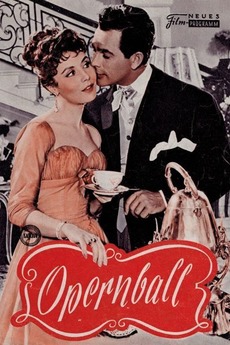
Opera Ball is a 1956 Austrian musical comedy film directed by Ernst Marischka and starring Johannes Heesters, Hertha Feiler and Josef Meinrad. Based on the 1898 operetta Der Opernball, it is part of the operetta film tradition. A previous film version had been made in 1939.
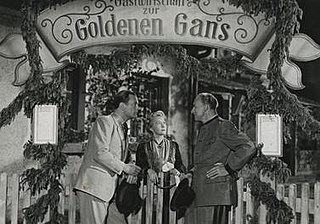
Kissing Is No Sin is a 1950 Austrian-German comedy film directed by Hubert Marischka and starring Curd Jürgens, Hans Olden and Hans Moser. The film takes its title from the waltz "Küssen ist keine Sünd" in Edmund Eysler's 1903 operetta Bruder Straubinger and features the song in its soundtrack.
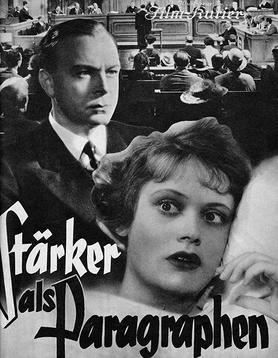
Stronger Than Regulations is a 1936 German mystery film directed by Jürgen von Alten and starring Paul Hartmann, Karl Hellmer and Manja Behrens. It was shot at the Grunewald Studios in Berlin. The film's sets were designed by the art directors Otto Guelstorff and Hans Minzloff.

Girls in White is a 1936 German musical comedy film directed by Victor Janson and starring Maria Cebotari, Iván Petrovich and Hilde von Stolz. It was shot at the Terra Studios in Berlin. The film's sets were designed by the art director

My Son the Minister is a 1937 German comedy drama film directed by Veit Harlan and starring Hans Brausewetter, Heli Finkenzeller and Françoise Rosay.

The Dream of Butterfly is a 1939 musical drama film directed by Carmine Gallone and starring Maria Cebotari, Fosco Giachetti and Germana Paolieri. It is an variation of the plot of the opera Madame Butterfly. A co-production between Italy and Germany, two separate versions were produced in the respective languages. It is also alternatively titled Madame Butterfly. It was one of several opera-related films directed by Gallone following on from Casta Diva (1935) and Giuseppe Verdi (1938).

Manolescu, Prince of Thieves is a 1933 German comedy crime film directed by Georg C. Klaren and Willi Wolff and starring Iván Petrovich, Alfred Abel, Ellen Richter and Mady Christians. It was shot at the Johannisthal Studios in Berlin and on location in St. Moritz. The film's sets were designed by the art director Hans Jacoby. It was produced and released just as the Weimar Republic was giving way to Nazi Germany.

The Schimeck Family is a 1935 German comedy film directed by E.W. Emo and starring Hans Moser, Käthe Haack and Hilde Schneider. It was shot at Johannisthal Studios in Berlin. The film's sets were designed by the art directors Karl Böhm and Heinrich Richter. It is based on the play The Schimek Family by Gustaf Kadelburg, previously adapted into a 1926 silent film and later into a 1957 Austrian film.

Back in the Country is a 1936 German drama film directed by Carl Boese and starring Hilde Weissner, Hans Stüwe and Hermann Speelmans. It is based on the 1910 novel of the same title by Hermann Löns. It was shot at the Babelsberg Studios in Potsdam and on location around Lüneburg Heath. The film's sets were designed by the art director Otto Gülstorff.



















